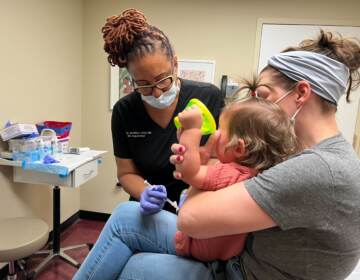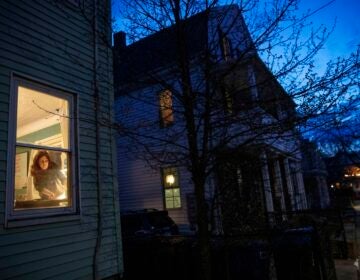Their father died of COVID-19 at the hospital where they worked. They still weren’t allowed to see him
Sisters Tammy King and Michelle Rouco worked as nurses at the same hospital where their father died of COVID-19. They still couldn’t be by his side.
Listen 5:00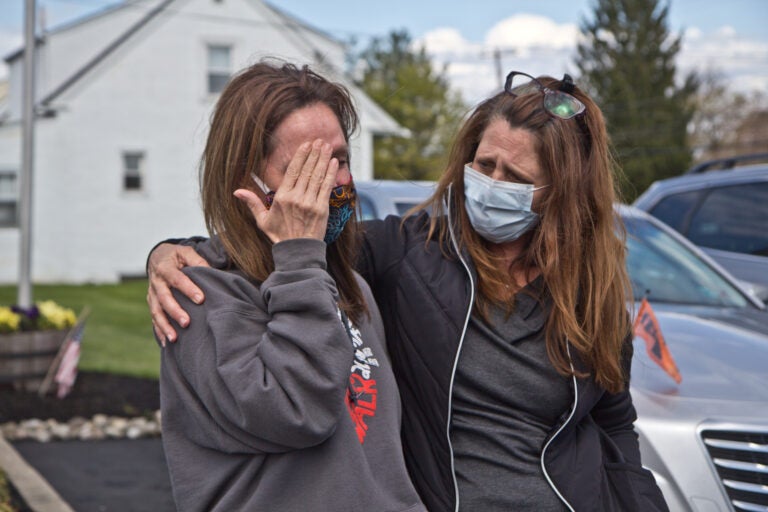
Tammy King (left) is comforted by her sister Michelle Rouco, both nurses, who were not allowed to see their father before he succumbed to COVID-19. (Kimberly Paynter/WHYY)
Are you on the front lines of the coronavirus? Help us report on the pandemic.
When Donald Spitko went to the hospital for shortness of breath, no one in his family imagined it would be the last time they saw him. Not his wife of 60 years, not his six grown children.
Spitko, 81, was placed on a ventilator almost as soon as he arrived at Einstein Medical Center in East Norriton where two of his daughters worked as nurses.
Grief is often an isolating experience, but never as lonesome as in the midst of a pandemic that keeps loved ones physically distant.
The hospital had a strict no-visitors policy — it even applied to Spitko’s two daughters, Tammy King and Michelle Rouco.
“We were trying everything to go see my dad,” said King, who usually works as a nurse in Einstein’s short procedure outpatient unit. “Honestly, we were beating down doors.”
After most outpatient services were cancelled or moved to telehealth, King was transferred to the main hospital. She says she worked just doors away from the room where her father was receiving care, and still wasn’t allowed to see him. She even got tested herself, to prove to the hospital administrators that she didn’t have the virus.
“I thought if I showed them that I was negative, I would at least be able to go to his window and see him through the glass,” she said. “They wouldn’t even let me through the ICU.”
Spitko’s wife had also tested positive for the virus, and had already recovered. She wasn’t allowed to visit her husband either. An Einstein spokesperson said in a statement that the policy aims to balance “the needs of patients while maintaining safety for all, and aligns with many other hospitals in our region.”
It didn’t seem fair — the sisters had the same access to protective gear as the nurses caring for their dad did. Rouco said it was too much knowing he was so close by. She changed her daily route to the cafeteria to avoid walking near his room.
“I could not walk down the same hallway because my dad was down that hallway,” said Rouco. “It was horrible.”
King took the opposite approach: She said she worked extra hours, because it made her feel closer to her dad. King served as the link between the doctors caring for Spitko and the rest of the family, who video chatted with him every day.
But after a few weeks, it got harder and harder to see him. Rouco said she would often pass on the chance to FaceTime. It just didn’t seem like he was getting any better.
“We kind of knew one day, just by the look on my dad’s face — it started turning empty is the only way I can describe it,” said King. “It was an emptiness.”
So, on April 20, after 25 days on a ventilator, the family made the heartbreaking decision to take him off of it. The nurse caring for their father said once the tube was removed, they’d likely have about 10 minutes before Spitko stopped breathing on his own. The family gathered around an iPad in Spitko’s living room in Montgomery County to say their goodbyes.
King struggled with the distance in those final moments. She couldn’t bear to be talking to an electronic device.
“You couldn’t go up to him and kiss him goodbye, you couldn’t touch his hand,” she said. “Everything was done backwards.”
Her sister, Rouco, said she was just grateful for the time they had — she guessed she saw more of her father via video chat than she might have pre-pandemic if she had been forced to wait her turn to visit him at the hospital.
Instead, the family kept vigil together. An hour passed, then another. They started telling stories about the person Spitko was, beyond just an 81-year-old man with COVID-19.
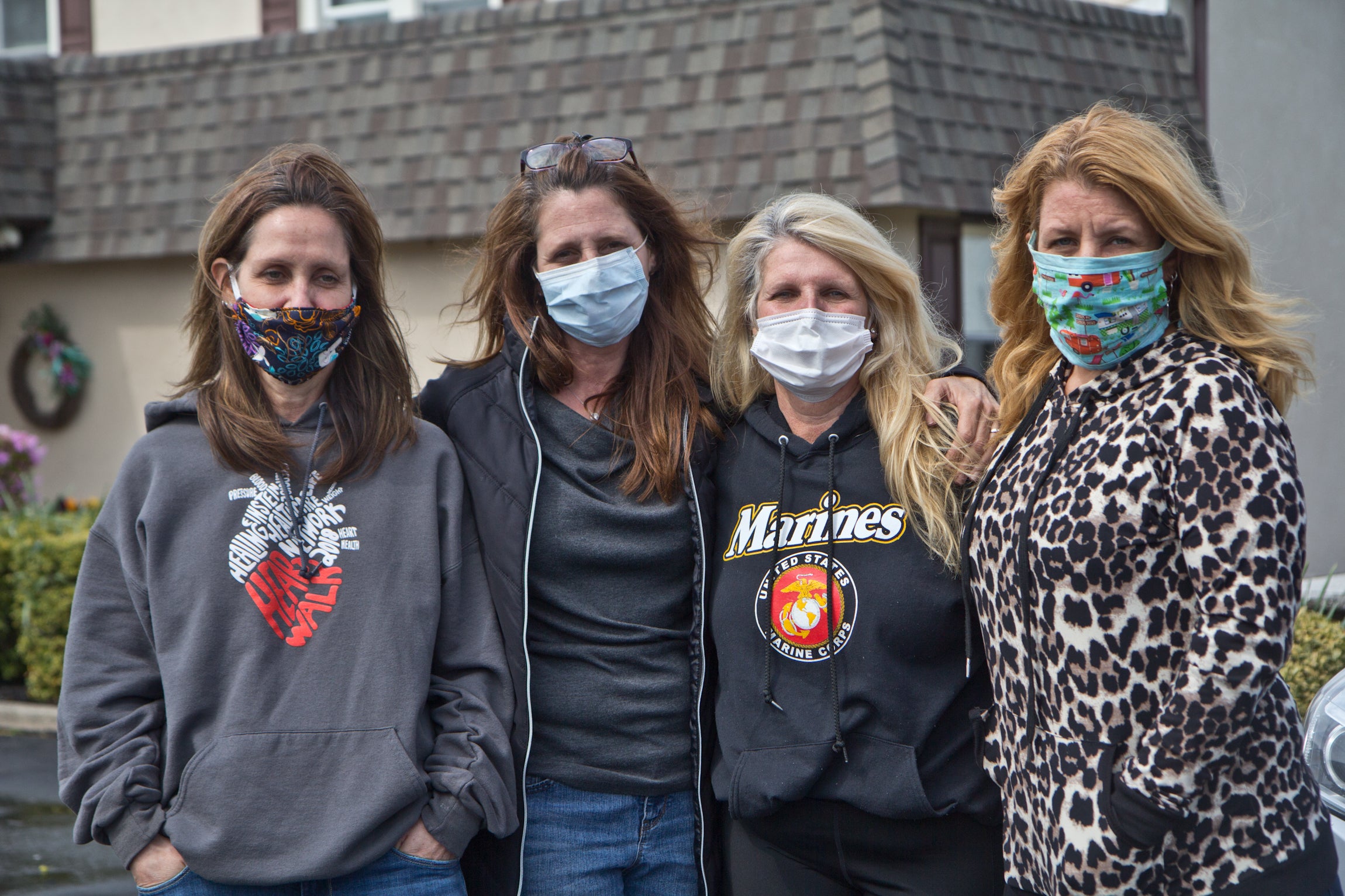
Donald J. Spitko was a proud marine for most of his life, and inspired his grandson to join the military. He loved to hunt, camp and go on road trips with his daughter, Sharon.
“He would be one of those people that if your car broke down, or your tire [went flat], he would get out … no matter what time it was and help them get fixed,” said King.
The sisters joked their dad was the easygoing one of the two parents. Their mother worked night shifts during their childhood, and when she would leave for work, Spitko would issue a warning about sneaking out: If you do it, just make sure you get home before your mother does.
“My dad would let us do anything,” King remembered.
After his breathing tube was removed, he stayed with his family for seven hours. As the battery on the hospital’s iPad was about to die, Spitko took his last breath.
For King, the whole thing was surreal.
“You don’t think it’ll happen to you or your family,” she said. “You think, like, you’re untouchable, until something this fast can come upon you.”
The next day, the sisters organized a funeral procession for their father. A caravan of about 20 cars gathered in the parking lot of the hospital and drove to the nearby Szpindor-Meyers Funeral Home, just a few blocks from Spitko’s home. Spitko’s niece brought up the rear in a bright yellow Jeep, with an American flag waving out the window in the rain.
When the procession arrived at the funeral home, family and friends hesitantly filtered out of their cars, hovering in small clusters, not quite sure what to do. They waved and shouted to one another from their respective parking spaces.

It’s always difficult to know how to comfort someone grieving. Not being able to hug or offer the usual physical gestures of condolence make it even harder, and people’s emotions are even more challenging to read with masks covering half their face.
Some family members gathered around a large red flag, emblazoned with a marine crest, to greet the remaining cars as they trickled in.
And that was it. There would be no viewing, no ceremony. Spitko’s body could not be donated to be used for science, as his daughters said he had always wanted. Visitors piled back into their own cars, and drove away.
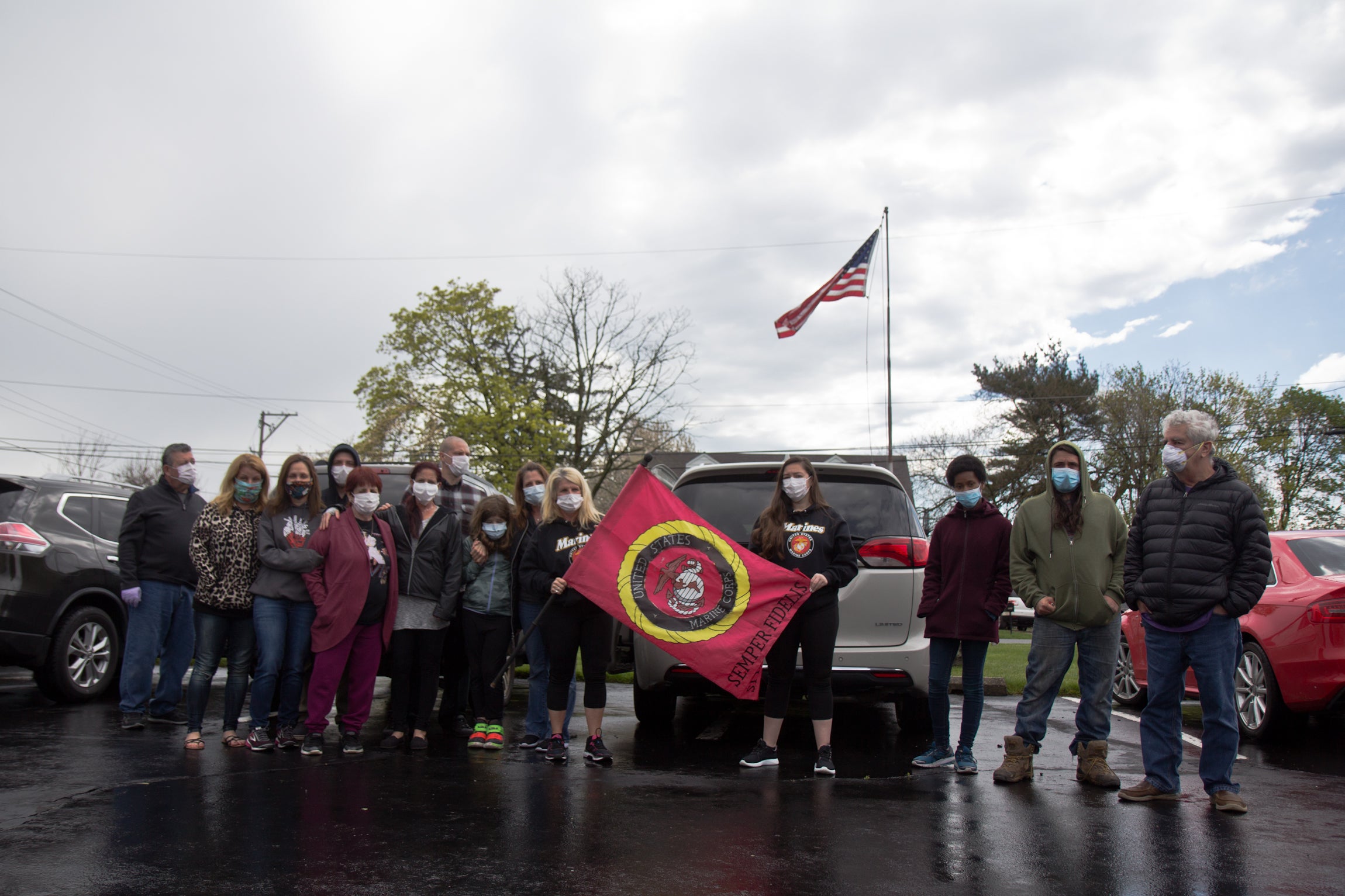
The night after her father died, King went to work at the hospital. She was trying to pick up as many hours as she could, but had stopped working regular shifts because she had been furloughed the day before.
While she was at the hospital, King got a call from the nurse who’d sat with her father while he died. She said she had something to give her.
For each family member, the nurse had placed two of Spitko’s finger prints in the shape of a heart. Below, she had written his name, the year he was born and the year he died. She rolled them up, tucked them in an unused blood tube and gave them to King.
The nurse caring for Spitko happened to be named Tammy, too. King said she hoped if nothing else, it was some comfort to her father to hear that name spoken by his side, since she couldn’t be there herself.
WHYY is your source for fact-based, in-depth journalism and information. As a nonprofit organization, we rely on financial support from readers like you. Please give today.


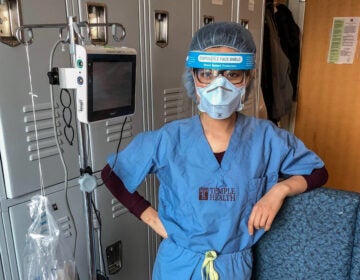
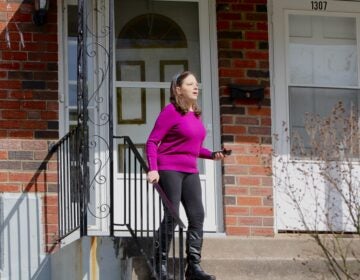
![CoronavirusPandemic_1024x512[1]](https://whyy.org/wp-content/uploads/2020/03/CoronavirusPandemic_1024x5121-300x150.jpg)

